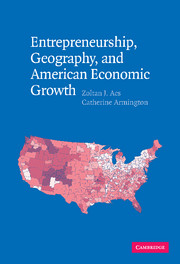Book contents
- Frontmatter
- Contents
- List of Tables and Figures
- Preface
- 1 Introduction
- 2 Entrepreneurship, Geography, and Growth
- 3 Regional Variation in Entrepreneurial Activity
- 4 Human Capital and Entrepreneurship
- 5 Entrepreneurship and Employment Growth
- 6 Summary and Theoretical Insights
- 7 A Formulation of Entrepreneurship Policy
- Appendix A: Firm Formation and Growth Data from the Longitudinal Establishment and Enterprise Microdata (LEEM)
- Appendix B: 1995 + 1996 Firm Formation Rates for U.S. Labor Market Areas with 1994 Labor Force and Establishments
- Appendix C: Service Industry Standard Industrial Classification (4-digit SIC) Codes and Their Subsectors, with 1995 Establishment and Employment and Changes to 1998, and 1996 through 1998 Firm Formations per 100 Establishments in Subsector in 1995
- Appendix D: 1991–1996 Employment Growth Rates and Share of High-Growth Establishments in Labor Market Areas, with 1991 Employment, Establishments, and Population, and 1991–1996 Population Growth and Relative Employment Growth Rates
- References
- Index
6 - Summary and Theoretical Insights
Published online by Cambridge University Press: 31 July 2009
- Frontmatter
- Contents
- List of Tables and Figures
- Preface
- 1 Introduction
- 2 Entrepreneurship, Geography, and Growth
- 3 Regional Variation in Entrepreneurial Activity
- 4 Human Capital and Entrepreneurship
- 5 Entrepreneurship and Employment Growth
- 6 Summary and Theoretical Insights
- 7 A Formulation of Entrepreneurship Policy
- Appendix A: Firm Formation and Growth Data from the Longitudinal Establishment and Enterprise Microdata (LEEM)
- Appendix B: 1995 + 1996 Firm Formation Rates for U.S. Labor Market Areas with 1994 Labor Force and Establishments
- Appendix C: Service Industry Standard Industrial Classification (4-digit SIC) Codes and Their Subsectors, with 1995 Establishment and Employment and Changes to 1998, and 1996 through 1998 Firm Formations per 100 Establishments in Subsector in 1995
- Appendix D: 1991–1996 Employment Growth Rates and Share of High-Growth Establishments in Labor Market Areas, with 1991 Employment, Establishments, and Population, and 1991–1996 Population Growth and Relative Employment Growth Rates
- References
- Index
Summary
The efficiency of transforming knowledge into economic applications is a crucial factor in explaining macroeconomic growth. New growth theory treats this factor as exogenous. The theory offers no insight into what role, if any, entrepreneurship and agglomeration play in the spillover of tacit knowledge. The answer to this question can be pursued through the lens of the “new economic geography” and the newest wave of entrepreneurship research. This book has pursued a better understanding of both the relationship between geography and technological change and that between entrepreneurship and technological change, because these lines of research may prove fruitful in better explaining variations in economic growth rates.
New growth theory emphasizes the crucial role of knowledge spillovers in macroeconomic growth, but it leaves out the regional dimension, although substantial evidence has been provided in the recent empirical economics literature that a significant share of knowledge spillovers is localized. The new economic geography extends this framework by pointing to both the interplay between spillovers and agglomeration and the resulting cumulative regional growth, but it leaves out the macroeconomic dimension. The theory of entrepreneurship focuses on the role of new firm formation and offers a knowledge spillover theory of entrepreneurship as one mechanism by which these spillovers affect regional growth. We first present findings on new firm formation and then on employment growth, followed by an outline of theoretical issues.
- Type
- Chapter
- Information
- Entrepreneurship, Geography, and American Economic Growth , pp. 143 - 153Publisher: Cambridge University PressPrint publication year: 2006



